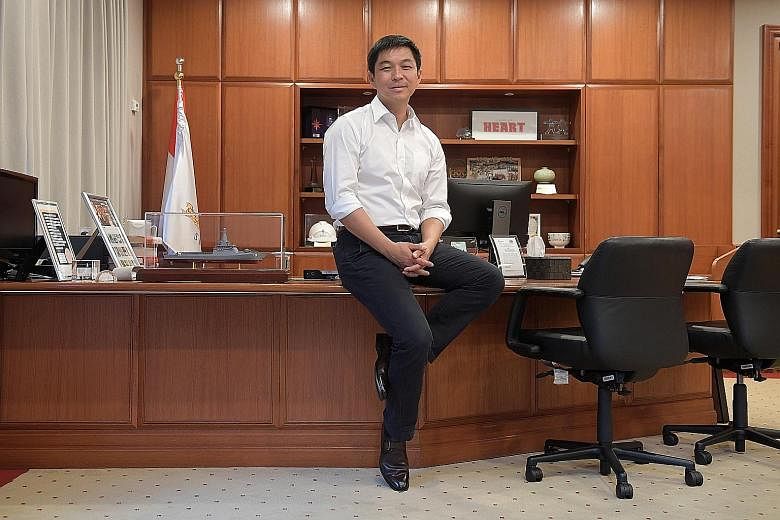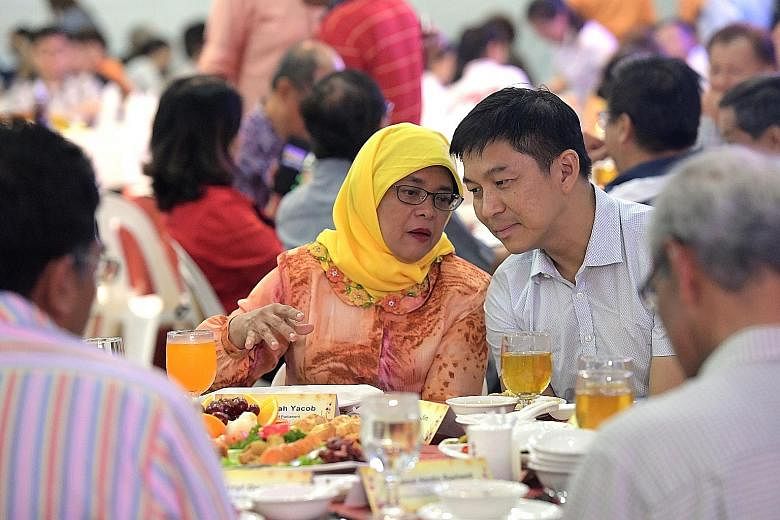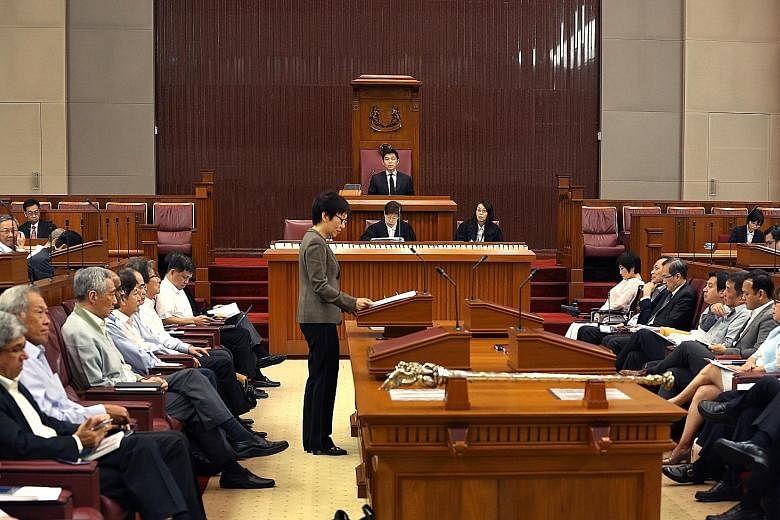He is one of the most prominent Singapore politicians on Facebook.
With more than 90,000 followers and about the same number of people "liking" him, Mr Tan Chuan-Jin has more than the typical 40,000 followers that younger ministers draw.
It is even more than veteran ministers, including deputy prime ministers Teo Chee Hean and Tharman Shanmugaratnam.
Only Prime Minister Lee Hsien Loong, Home Affairs and Law Minister K. Shanmugam and Foreign Minister Vivian Balakrishnan are more popular online than the boyish-faced Mr Tan, 48.
His Facebook fans reacted with shock when news broke early last month that he was resigning from Cabinet as Minister for Social and Family Development to take up the post of Speaker of Parliament.
One month into the new job, Mr Tan speaks to Insight in his first exclusive media interview at his new office on the second storey of Parliament House, with a sweeping view of the Singapore River.
THE ADJOURNMENT MOTION TEST
Mr Tan walked into a small storm that had started even before his first session of Parliament as Speaker on Sept 11.
Workers' Party (WP) chairman Sylvia Lim wanted to speak on the elected presidency that day.
Two People's Action Party (PAP) members also wanted to speak on other issues: Bukit Batok MP Murali Pillai on community sentencing and Sembawang GRC MP Vikram Nair on national service.
But each Parliament sitting can accommodate only one adjournment motion where an MP speaks for 20 minutes on a topic of urgent public importance.
A ballot - which involves drawing lots - was held and Ms Lim lost.
She made a second bid to speak on the same topic at the following Parliament sitting on Oct 2.
She lost the ballot again to Ang Mo Kio GRC MP Intan Azura Mokhtar, who spoke on preserving green space and heritage in her Jalan Kayu ward.
Mr Tan jokingly suggested to Ms Lim that they broadcast the balloting live on Facebook. However, they both agreed they should not go overboard on this.
Accusations of filibustering flew that the PAP MPs had filed their proposals to speak to block the WP MP, some charged. This drew a sharp rebuttal from Mr Nair, who said he had filed his proposal to speak as far back as July.
WP made a third attempt to speak on the topic on Oct 3.
The WP won the ballot and got 20 minutes' airtime in the House to speak on the elected presidency.
Referring to his earlier offer to broadcast the balloting process, Mr Tan says transmitting it live on Facebook can help the public understand how Parliament works.
-
'I see Speaker's role as an important role'
-
When it was announced early last month that Mr Tan Chuan-Jin would resign from the Cabinet to take up the Speaker of Parliament appointment, an awkward question reared its head in the minds of some people:
Was the high-flying Singapore Armed Forces overseas scholarship holder and former brigadier-general, once touted as a core member of the next-generation leadership team, demoted?
Mr Tan was not offended when Insight asked: "Were you demoted?"
He says: "It's a very fair question in people's minds. I can fully understand why people wonder about that. I guess if I were a member of the public, I would be kind of 'kaypoh' (Hokkien for busybody) to also want to know. And I've had various dialogues and you could sense the audience wanting to ask, but (were) either too polite to or not sure how to phrase it."
The Speaker is higher in protocol than a Cabinet minister, but earns less than a Cabinet minister and does not make policies.
Mr Tan acknowledges that the move can be seen as a step up or a step down. "It doesn't really matter to me how you want to see it - you could see it in both ways, but I see the role as an important role," he tells Insight.
He discloses that he had a pay cut. "The pay was adjusted," he says, without elaborating.
A minister's annual salary starts at $935,000, whereas the Speaker's annual salary is fixed at $550,000. It is also a part-time job.
"I operate on the basis that when I entered public office, it was not permanent. I don't leverage myself to the hilt, I don't change my lifestyle in very fundamental ways," Mr Tan says. "I should never be beholden to a job - I should never be beholden to (my) pay or privileges or whatever it is, because that's disastrous."
Toh Yong Chuan
"I see the Speaker's role really as bridging Parliament and the public as well, and helping to create that accessibility," he adds.
"Clearly from the things that were being exchanged online, people didn't quite understand what it meant when you say you have a ballot," he notes.
Some thought that because the PAP dominated Parliament, it was able to pick the adjournment motions tabled by its own MPs, thus shutting out the WP.
"We are basically drawing lots from the adjournment motions that were filed," he stresses.
ROBUST DEBATE AND FAIRNESS IN A ONE-PARTY-DOMINANT HOUSE
Mr Tan is aware that he presides over a House dominated by the PAP and the perceptions associated with it.
"Having a Parliament where you have the ruling party as the dominant party, you do need to be impartial and fair," he says, adding, "and you do need to quite deliberately make an effort to do that."
He points out to Insight that although the WP has nine seats - six elected MPs and three Non-Constituency MPs - in the 100-member House, its MPs have filed about one-third of the oral parliamentary questions.
"The process has been quite fair (to the WP)," he says.
In his inaugural speech as Speaker on Sept 11, Mr Tan said he wanted to facilitate robust debate in the House.
"I want to facilitate good, free-flowing debate where the desired outcome is better policies and laws. I will be impartial and fair, but I will also be firm," he said in the speech.
He tells Insight that facilitating a robust debate means exercising some flexibility during Parliament sittings.
The debates in Parliament are already robust, he notes. But there can be situations where more time can be allocated to discuss issues.
These can be "issues that are contentious, issues that clearly individual MPs are passionate about or which the public has a deep interest in", he says.
In these cases, even though the debate time limit may have been exceeded, Mr Tan says he is prepared to let it "run for a little more".
He points out that he is also prepared to give MPs more leeway in probing ministers during parliamentary questions if the ministers "haven't quite answered particular angles".
-
Trend emerges of MPs surfacing issues for debate
-
Increasingly, MPs are turning to some infrequently used tools to get their voices heard and have pet topics debated in the House.
The total number of adjournment and private member's motions filed by MPs for debates in the House in the past two years has exceeded the total for the preceding four years (see table).
Between last and this year, MPs have debated 14 adjournment motions on issues ranging from extending parental leave to the types of lights used at Housing Board estates. In the same period, there were also debates on four private member's motions on issues such as combating drugs and helping Singapore women achieve their aspirations.
Between 2012 and 2015, there were 14 adjournment motions but no private member's motions.
In a private member's motion, several MPs can speak on the issue.
In an adjournment motion, however, only the MP who files the motion gets to speak on it for 20 minutes, and the minister has 10 minutes to give a reply. It is usually held just before the sitting ends for the day, or when Parliament adjourns - hence the name.
The adjournment motion in parliamentary procedure came under the spotlight just last month, when one of the first tasks newly appointed Speaker Tan Chuan-Jin had to handle was the unsuccessful attempts by the Workers' Party (WP) to file a motion to debate the issue of how the counting of terms for the reserved presidential election was decided.
The WP succeeded on its third try after losing the ballot - which involves drawing lots - twice to People's Action Party (PAP) MPs who wanted to file motions on other topics.
Nee Soon GRC MP Louis Ng, who spoke in an adjournment motion in August on extending parental leave for parents with premature babies and multiple births, says the format allows an issue to be debated at greater depth compared with parliamentary questions. "It moves away from the 'question, reply, move on' format of parliamentary questions," he says. "It also allows an MP to set the agenda of the sitting."
MacPherson MP Tin Pei Ling agrees. "The private member's motion allows an issue to be debated in depth. MPs can deliver full speeches and ministers can reply. The debate can also stretch to more than one day," she says. She initiated a private member's motion to debate the aspirations of Singapore women in April.
The trend of MPs using these motions to air their views is set to continue. Sembawang GRC MP Vikram Nair has been trying to speak on national service since August, and at least one PAP MP has told Insight that several PAP House members are mulling over a private member's motion on a topic to be disclosed later.
Toh Yong Chuan
"I've been on the receiving end before as well, and some of the MPs are quite insistent," he says with a laugh.
But he adds: "If I feel the answer has been given and they are still pursuing along the same lines, then I'll say that 'I think the question has been answered, let's move on.' "
The key to having a robust debate in Parliament is MPs keeping to the rules of debate and maintaining decorum, Mr Tan says.
"You've seen how robust debates can degenerate into heated and unruly debates in other Houses of Parliament," he notes.
He did not cite any examples. However, MPs brawling in Parliaments overseas make the news from time to time.
For example, fights are known to happen in a number of legislatures in Asia, including in Japan, South Korea and Taiwan.
"We want to maintain the decorum of the House and I think we can do so without necessarily compromising the space afforded them to carry out their debate," he says of Singapore's MPs.
The decorum also extends to how MPs behave in the House during sittings, even if they are not participating in debates.
Two weeks ago, socio-political commentator Bertha Henson wrote on online site The Middle Ground that some office-holders were not paying attention to the debate in Parliament on Oct 3, but were "plainly doing non-parliamentary work" on their laptops instead.
Wi-Fi access was granted to MPs in the chambers in August this year.
This allowed MPs to have speedier access to their parliamentary materials, Mr Tan tells Insight.
But he notes that the Standing Orders that govern parliamentary proceedings require House members to pay attention to what goes on and not be distracted by laptops and mobile phones.
"Parliament is a place where important issues, issues of national significance, are discussed, and I trust that members act accordingly," he says. "I have informed the Leader and Whip to remind the MPs of this."
'BALL ALSO IN MPs' COURT'
Political observer and former Nominated MP Eugene Tan says the new Speaker is heading in the right direction.
"Flexibility is necessary to ensure issues are given adequate airing and robustly debated in the House," says the associate professor of law at Singapore Management University.
"On key issues, it is important that they are thoroughly aired and that the Government's position prevails, not because of its dominance, but rather the strength of its ideas, the deliberative process that helps engender buy-in, and the persuasive force of its position within our system of government," he adds.
But he notes that the MPs themselves have to play their part too.
"MPs need to come prepared and be committed to participate in the debates without fear or favour.
"They should always be mindful that in Parliament, they are first and foremost representatives of their constituents with their role as party member playing a subordinate role," Professor Tan says.
The new Speaker himself agrees, saying: "I can't dictate what they say if they choose not to be robust. There's not much I can do about it."





